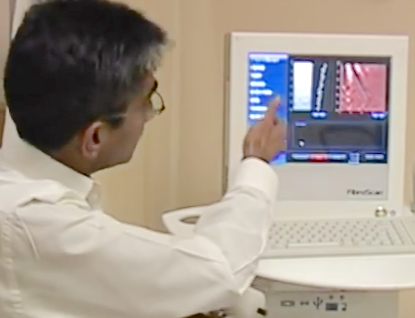Next page: Other noninvasive biomarkers
Liver stiffness (FibroScan)
Measuring liver damage
Before starting HCV treatment it is important to check for liver damage.
People with cirrhosis (advanced liver scarring) may need to be treated by a liver specialist, and may need to avoid certain DAAs.
Liver stiffness (FibroScan)
In the UK, scans such as FibroScan are recommended for monitoring liver health in people with coinfection.
This scan is painless: zero pain and zero risk. It takes less than ten minutes and produces immediate results. FibroScan has dramatically reduced the need for having a liver biopsy.
youtube.com/watch?v=l_E4ZGmKooA
FibroScan asseses liver stiffness by measuring how quickly vibration waves pass through the liver. The more damaged or stiff the liver, the more rapidly the waves will pass through it. Results are presented as a number in kilopascals (kPa). A higher number indicates more liver damage.
Results from FibroScan need to be interpreted based on other factors.
A score of over 7.2 kPa indicates higher likelihood of significant fibrosis. A score over 14.5 kPa in someone with HCV/HIV coinfection indicates cirrhosis.
However, FibroScan is not a perfect test and does not work for everyone.
- It can be too difficult to perform and results may be unreliable in people who are obese.
- It can overestimate damage in recently acquired HCV.
- It is less sensitive at detecting small differences between mild or moderate liver damage.
However, FibroScan is very sensitive at picking up severe damage. It can therefore identify people who need HCV treatment more urgently.
If FibroScan results indicate serious liver damage, the test should be repeated to confirm the results.
Other non-invasive biomarkers
If FibroScan is not available, a panel of blood tests can sometimes be used to assess liver damage.
Combinations of lab results can help identify serious liver damage. Results are pretty good but they are not quite as useful as a FibroScan or biopsy.
In the UK, if a FibroScan is not available, or if FibroScan results are not clear, then monitoring using non-invasive blood panel tests is recommended before deciding on a biopsy.
These panels of tests include APR, FIB-4, ELF, FibroMeter and FibroTest.
Screening for liver cancer in people with cirrhosis
People with cirrhosis from HCV are at risk for liver cancer, even if they have been cured.
Regular screening can detect early-stage liver cancer.
This is usually an ultrasound, computed tomography (CT) or Magnetic Resonant Imaging (MRI) scan. It also includes a blood test for alpha-fetoprotein (AFP; a protein made in foetal liver tissue).
Screening is usually every six months.
Last updated: 1 November 2024.

